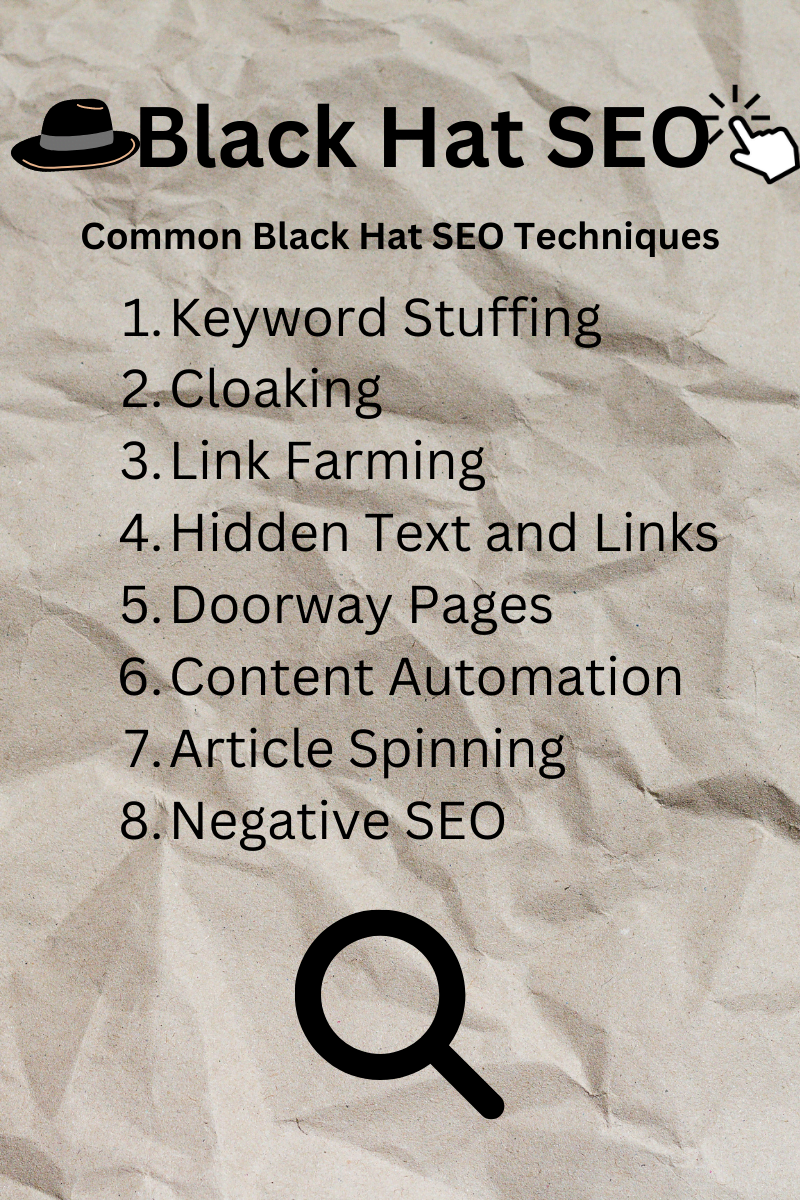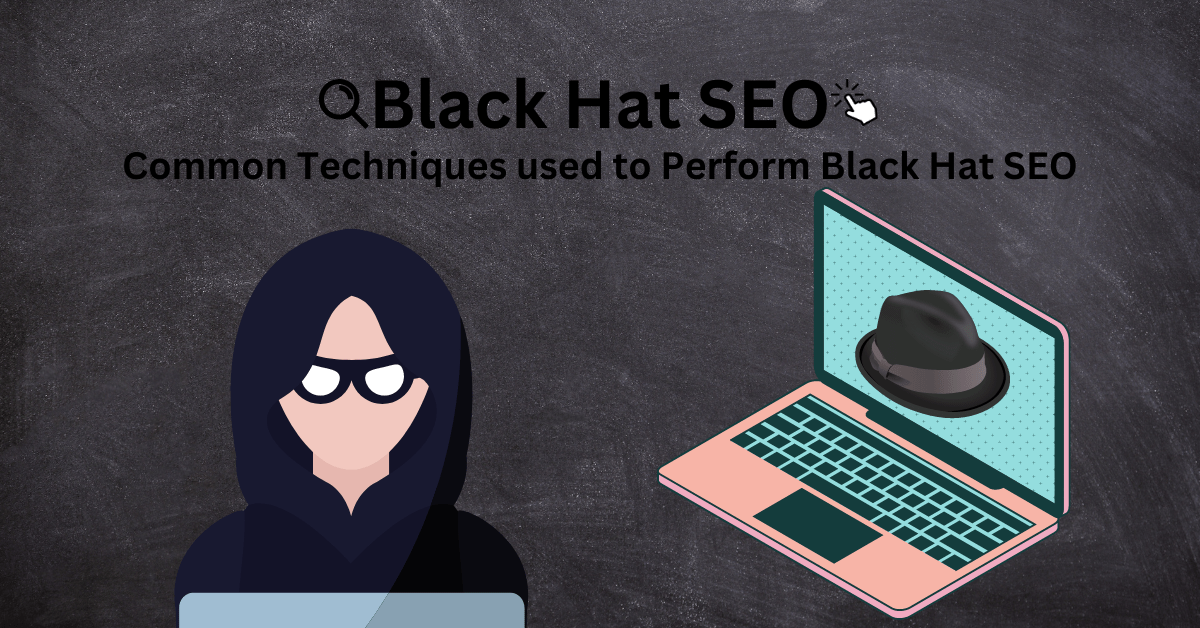Introduction
In the ever-evolving world of search engine optimization (SEO), website owners and digital marketers are constantly seeking ways to improve their rankings and attract more organic traffic. While there are legitimate techniques to achieve these goals, some individuals resort to unethical practices known as black hat SEO. In this article, we will delve into what black hat SEO entails, the common techniques used, and the potential consequences associated with it.

What is Black Hat SEO?
Black hat SEO refers to a set of techniques that aim to manipulate search engine algorithms in order to achieve higher rankings, despite violating the search engine guidelines. These techniques prioritize quick results and are often driven by a desire for immediate success rather than long-term sustainability. Unlike white hat SEO, which focuses on ethical optimization practices, black hat SEO takes shortcuts and risks that can harm a website’s reputation and visibility in the long run.
Common Black Hat SEO Techniques
1. Keyword Stuffing
One of the oldest black hat techniques is keyword stuffing. This involves excessively using keywords, often in an unnatural manner, with the aim of increasing keyword density and search engine visibility. However, search engines have become smarter in detecting keyword stuffing and now penalize websites that engage in this practice.
2. Cloaking
Cloaking is a technique where different content is shown to search engines and website visitors. By presenting optimized content to search engines while displaying unrelated or misleading content to users, website owners hope to manipulate search rankings. However, this deceptive practice violates search engine guidelines and can result in severe penalties.
Also Read about how to Utilize SEO For Online Business
3. Link Farming
Link farming involves creating or participating in networks of websites solely for the purpose of artificially inflating the number of backlinks pointing to a target website. These link farms are typically low-quality websites with little or no real value to users. Search engines can identify such schemes and penalize websites involved in link farming.
4. Hidden Text and Links
Black hat SEO practitioners may employ hidden text and links by using techniques to hide keywords or links within a webpage’s code or by making them the same color as the background, rendering them invisible to users. This technique is aimed at fooling search engines into ranking the website higher for those hidden keywords. However, search engines have become adept at detecting such tactics and can impose penalties accordingly.
5. Doorway Pages
Doorway pages, also known as bridge or gateway pages, are designed to rank well for specific keywords and phrases and redirect users to different content once they visit the page. These pages are created solely for search engine bots, not for human visitors, and are seen as a deceptive technique to manipulate search engine rankings.
6. Content Automation
Content automation involves the use of software or scripts to generate large amounts of low-quality content automatically. These autogenerated articles are often of little value to users and are created solely to attract search engine traffic. However, search engines have become more sophisticated in identifying such content and can penalize websites that employ this technique.
7. Article Spinning
Article spinning involves using software or tools to rewrite existing articles by replacing words or phrases with their synonyms, resulting in multiple versions of similar content. This technique aims to create the illusion of unique content while maximizing search engine visibility. However, search engines are increasingly able to recognize spun content, and using this technique can lead to penalties.
8. Negative SEO
Negative SEO is a malicious practice where competitors or individuals attempt to harm a website’s rankings by engaging in black hat techniques on behalf of the target website. This can include creating spammy backlinks, hacking the website, or spreading false information about the site. Such attacks can have devastating consequences for the targeted website’s organic traffic and online reputation.
Consequences of Black Hat SEO
Engaging in black hat SEO techniques can have severe consequences for website owners. Here are some of the potential risks associated with black hat SEO:
Search Engine Penalties: Search engines have sophisticated algorithms that can detect and penalize websites employing black hat techniques. Ranking drops and full removal from search engine results are also possible penalties.
Damage to Online Reputation: Implementing unethical SEO practices can lead to a damaged online reputation. Users may lose trust in a website that resorts to deceitful tactics, resulting in a loss of credibility and potential customers.
Loss of Organic Traffic: Black hat SEO techniques may lead to short-term gains, but they are not sustainable in the long run. When search engines detect these practices, they can decrease a website’s visibility or remove it from search results altogether, resulting in a significant loss of organic traffic.
Conclusion
While black hat SEO techniques may promise quick results, the risks associated with engaging in unethical practices far outweigh the potential benefits. Search engines continuously evolve to detect and penalize websites employing black hat SEO, and the damage caused to a website’s reputation and visibility can be irreversible. Instead, website owners and digital marketers should focus on ethical, white hat SEO techniques that prioritize long-term success and user satisfaction.
FAQs
Q1: Is Black Hat SEO worth the risk?
A1: No, engaging in black hat SEO is not worth the risk. The potential consequences, including search engine penalties and damage to online reputation, far outweigh any short-term gains.
Q2: How can I identify if my website has been targeted by black hat SEO techniques?
A2: Look for sudden drops in search engine rankings or changes in website traffic. Unusual backlink profiles, irrelevant keywords, and suspicious changes in website content can also indicate the use of black hat SEO.
Q3: Are there any legitimate SEO techniques that overlap with black hat SEO?
A3: Some techniques may fall into a gray area, where they can be considered both legitimate and unethical, depending on how they are implemented. It is crucial to stay updated with search engine guidelines and best practices to ensure compliance.
Q4: Can a website recover from search engine penalties caused by black hat SEO?
A4: Yes, it is possible to recover from search engine penalties caused by black hat SEO. However, the recovery process can be time-consuming and challenging. It involves identifying and removing any black hat practices, improving website quality, and building a strong foundation of white hat SEO techniques.
Q5: Are there any benefits to using white hat SEO instead?
A5: Absolutely! White hat SEO focuses on ethical optimization practices that prioritize long-term success and user satisfaction. By employing legitimate techniques, websites can build a strong online presence, attract targeted organic traffic, and establish a trustworthy reputation.
